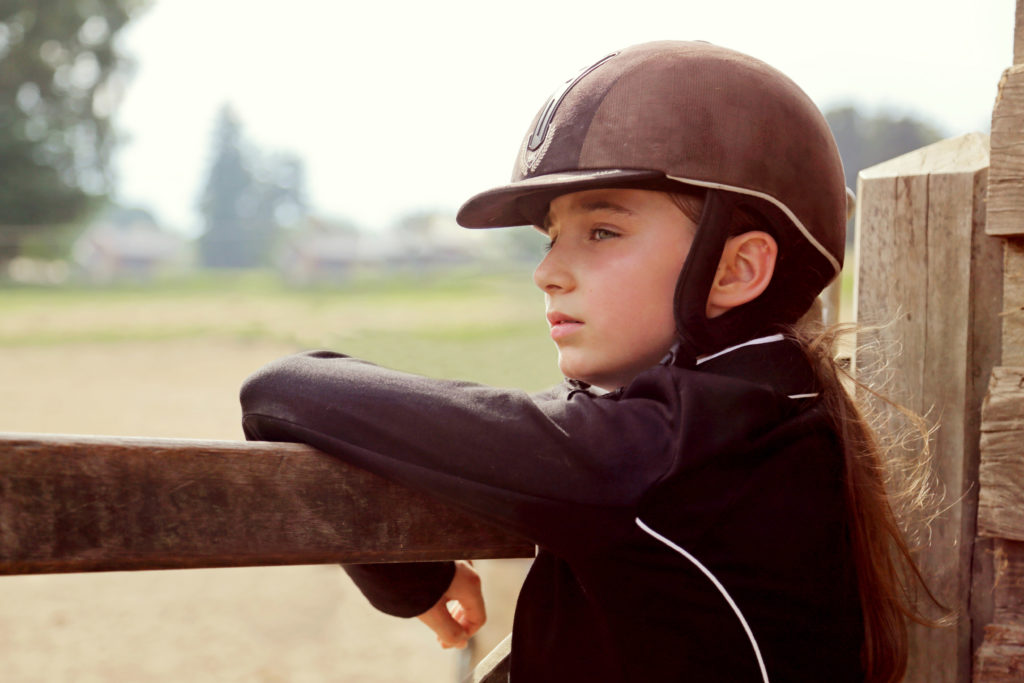Thumbs Down to Belittling and Bullying
In this excerpt from Bolder, Braver, Brighter, Coach Daniel Stewart helps you evaluate whether your trainer is the right individual to help you reach your goals.
You might recall riding for a trainer who tried to teach you to be tough by teaching you in a tough manner. Instead of reinforcing persistence and rewarding effort, the teaching style might have made you feel more like you were being belittled and bullied. Unfortunately, overly critical teaching methods (intimidation and humiliation rather than motivation) have been proven to cause riders to feel inadequate, shame, fearful of failure, worried about letting people down, and disappointed in themselves.
While the intention was good (to teach you something), the delivery was bad because your brain always responds the same way when you’re feeling attacked (physically or verbally).
You become tense, tight, and tentative as your brain prepares to flee or freeze. This is why so many riders struggle to perform for threatening coaches, and why many of those riders end up quitting the sport altogether. Verbal threats cause your brain to freeze (leading to frustration because you just can’t seem to do anything right), and flee (eventually giving up because riding is no longer satisfying, rewarding, or even enjoyable).
The good news is that modern coaching programs are now certifying a new breed of trainer—a coach who’s educated using the latest sport-performance and athlete-development data. One who knows that performance only goes up when a rider doesn’t shut down. One who doesn’t believe toughness comes from being able to hold back tears of shame, or return tomorrow after crying all day today. A coach who realizes that the social and emotional skills learned at the barn are just as important as the physical ones.
But…not everyone gets a trophy!
Modern coaches don’t necessarily believe everything is about rainbows and unicorns. They understand the value of failure and mistakes, and help their students experience, accept,
and learn from them. These trainers don’t give participation awards. They know if you’re winning every class, you’re entered in the wrong classes. They know if you’re not failing or making mistakes, you’re just not trying hard enough. But they’d never allow you to take these experiences personally, meaning they’d never allow you to feel like a mistake just because you made one, or feel like a failure because you failed. These trainers aren’t necessarily always warm and fuzzy (and may even use a stern voice) but they know that being overly cold and prickly will make it nearly impossible for anyone to learn what they’ve been tasked to teach.
Inappropriate coaching occurs in many ways. Recognizing and becoming mindful of the ways is an important step to overcoming them. The importance of this cannot be overstated. Below are 10 signs a trainer might be doing more insulting than instructing:
- Make insulting remarks about your ability.
- Make shaming comments about your body.
- Verbally abuse you in front of others.
- Compare you negatively to other riders (often in front of them).
- Question your commitment to our sport.
- Humiliate you by teasing, mocking, or making fun of you.
- Constantly remind you of your past mistakes and failures.
- Call you a failure or say that you’ll never amount to anything.
- Talk bad about other coaches.
- Insult, gossip, or spread rumors about you, or other riders.
Most coaches who employ these tactics aren’t usually aware they’re doing it, but unfortunately some are incapable of changing (or even admitting that change is required). Many simply do it because their coaches did it, but it doesn’t change the fact that learning can’t occur when a student feels threatened or intimidated. The job of a coach is to mentor and motivate. Teaching through intimidation or humiliation is simply using the wrong tools for the right job.
A very small percentage of riders make it to the national or international level. This means that the vast majority of equestrians simply ride for the love of the horse, to enjoy the experience, develop physical and social skills, be outdoors and athletic, and enjoy time spent with their friends and teachers. If you feel a coach is standing between you and any of this, remember that you have a choice. You can break the pattern, take back control, and regain your self-esteem by following these four tips:
- Remind yourself that coaches are doing their best (even though it’s not very good). Perhaps they coach this way because they grew up with a trainer who intimidated or humiliated them. Doing this helps to put you in a position of control, and allows you to stop feeling responsible for their actions. Taking the high road by trying to see the best in the worst teachers, is what’ll start you down the road toward regaining your confidence and control.
- Have an honest conversation with the coach. Let him or her know exactly how you feel and be prepared to give examples of when you felt humiliated, insulted, bullied, or belittled. You might even want to prepare a written script and read from it during the meeting (it’s so hard to remember things when you’re nervous!). This will be difficult, but without the courageous effort, change won’t occur (for you or any other rider).
- If coaches accept the conversation (many won’t) offer to help them by scheduling additional meetings so you can offer them periodic updates. This will help them become more mindful of their actions (and become a better coach) while also helping you feel like you’re no longer the problem, but a part of the solution.
- If your coach resists your attempts to help, find a new coach. The time spent with your horse, sport, and riding mates is just too valuable to allow anything (or anyone) to take it away from you. Maybe you’ll have to drive a little farther to get to the new barn, but at least you’ll be looking forward to getting there!
You’re wonderful and worthy and deserve to believe it, but it doesn’t come from hoping you’ll get the traits, talents, and toys of someone else, and it doesn’t come from being intimidated or humiliated. It comes from developing a strong inner sense of pride, self-respect, and self-satisfaction that says, I’m enough. Never try to be like someone else or impress someone else. You’re too busy liking yourself.
This excerpt from Bolder, Braver, Brighter by Coach Daniel Stewart is reprinted with permission from Trafalgar Square Books (www.horseandriderbooks.com).


